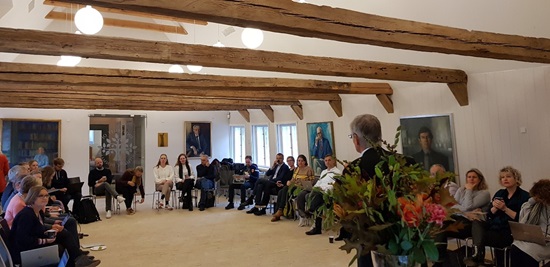.jpg)
SDU’s 2nd annual symposium put recruitment on the agenda
On Thursday October 31st, SDU’s International Gender Advisory Board were panelists when SDU welcomed everyone to an afternoon focused on gender perspectives in recruitments to academic positions at the university.
The more than 100 participants once again consisted of students, employees and interested external attendees. SDU’s vice-chancellor Henrik Dam welcomed everyone, followed by Ole Skøtt, Dean of the Faculty of Health Sciences and chair of SDU's central gender equality committee, who went on to present the panelists from SDU's International Gender Advisory Board.
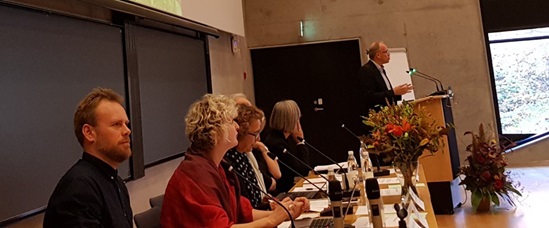
Eva Sophia Myers, team leader of SDU’s Gender Equality Team, next presented a brief status of the gender equality endeavors at SDU, including the work with recruitments, and using a case exercise nicely illustrated the challenges inherent in this work.
The program consisted of a two-part symposium with the first part focused on why it is important to work with gender perspectives in recruitment. María Bustelo initially demonstrated how both the gender balance in research teams and the integration of the gender dimension in research are neglected in the project applications EU receive. Tomas Brage summed up several results from LERU's efforts on the topic, and emphasized the great and often untapped potential inherent in universities' gender and diversity efforts. Yvonne Benschop underlined how the complex academic career system and advancement criteria in and of itself is gendered, and Mathias Wullum Nielsen further questioned the problematic meritocracy ideal and evaluation criteria.
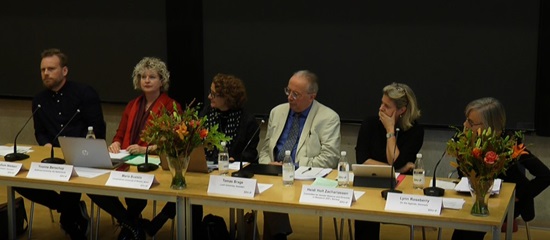 Following a quick break, the panel changed its focus from why to how recruitment processes can factor in gender perspectives in practice. Here, Heidi Holt Zachariassen explained how its the process itself and not the outcome that needs to be central, and that all involved parties must be made aware of how to address unfortunate and often gendered distortions during the process. Tomas Brage also pointed out this need to qualify those responsible for academic recruitments, particularly managers, as well as the need to work actively to reduce discriminatory behavior. Lynn Roseberry added to this by illustrating how recruitment changes can only be successful if managers perceive such changes as relevant and relatable, competence enhancing and something they have a chance to influence. In addition, Roseberry underlined the importance of a long-term change effort aimed at inclusion rather than diversity; an effort focused on countering bias in all aspects of the university's practices and decision making processes.
Following a quick break, the panel changed its focus from why to how recruitment processes can factor in gender perspectives in practice. Here, Heidi Holt Zachariassen explained how its the process itself and not the outcome that needs to be central, and that all involved parties must be made aware of how to address unfortunate and often gendered distortions during the process. Tomas Brage also pointed out this need to qualify those responsible for academic recruitments, particularly managers, as well as the need to work actively to reduce discriminatory behavior. Lynn Roseberry added to this by illustrating how recruitment changes can only be successful if managers perceive such changes as relevant and relatable, competence enhancing and something they have a chance to influence. In addition, Roseberry underlined the importance of a long-term change effort aimed at inclusion rather than diversity; an effort focused on countering bias in all aspects of the university's practices and decision making processes.
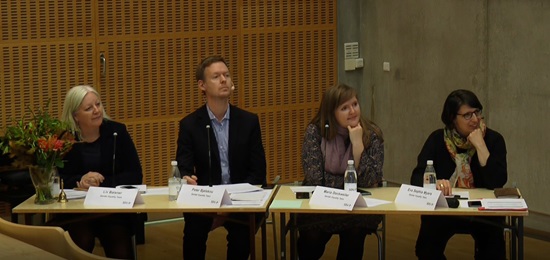
The panelists' presentations were qualified along the way by questions from SDU's Gender Equality Team, and during the last part of the symposium all the attendees were also encouraged to ask question or provide inputs. Questions from the audience included suggestions for strategies on how to counter resistance to gender equality efforts, comments on the importance of a visible managerial commitment to gender equality work, and a suggestion to initiate career evaluations also of tenured associate and full professors. The dialogue in plenum further lead to a substantiation of the fact that the gender dimension in research itself also needs to be addressed as part of the gender and equality efforts in the university sector. Lastly, it was argued that one way of spreading the knowledge about and relevance of gender equality efforts at the universities could be to engage a wide range of university employees as a civil society and build on their specific expertise and personal experiences, and also to cross-combine existing or preliminary studies, for example on what measures work in relation to retaining an underrepresented category of employees in a specific research field. The presentation from the symposium are available here.
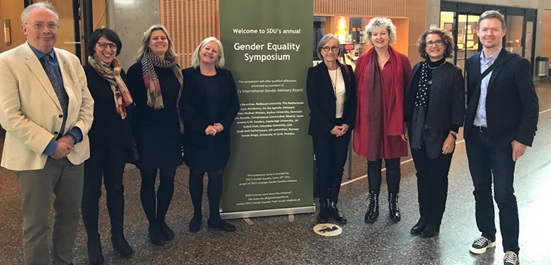 During their two-day visit in Odense, the members of SDU’s International Gender Advisory Board also participated in workshops with employees from SDU's central and local gender equality committees. Here, they consulted directly with managers and committee members, and their qualified recommendations to SDU's continuous gender equality endeavor included securing a systematic organizing and implementation of gender equality plans; focusing on the entire academic career path from recruitment to promotion processes; increasing awareness of the gender dimension in research, and continuing the newly launched work with gender budgeting. Last but not least, the International Gender Advisory Board praised SDU for its innovative and great work.
During their two-day visit in Odense, the members of SDU’s International Gender Advisory Board also participated in workshops with employees from SDU's central and local gender equality committees. Here, they consulted directly with managers and committee members, and their qualified recommendations to SDU's continuous gender equality endeavor included securing a systematic organizing and implementation of gender equality plans; focusing on the entire academic career path from recruitment to promotion processes; increasing awareness of the gender dimension in research, and continuing the newly launched work with gender budgeting. Last but not least, the International Gender Advisory Board praised SDU for its innovative and great work.
